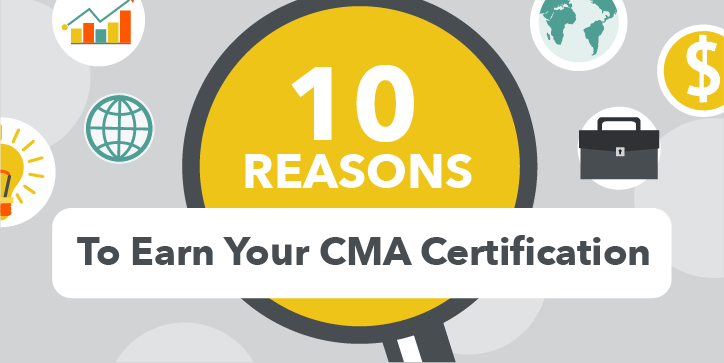10 Reasons to Earn Your CMA Certification
Nathan Liao from CMA Academy here. John has been kind enough to let me tell you all a bit about the CMA certification, and why you may want to consider earning one. Please contact me with any questions or comments you have after reading!
Becoming a CMA takes a lot of time, energy and money.
It requires dedication and discipline, and if I'm being completely honest, many people struggle on the way.
So why on earth would you want to invest so much into one certification?
For many reasons. In fact, I’m going to share 10 solid reasons why earning your CMA is not only advantageous for your career, but how it essentially pays for itself.
Offers a Unique Skill Set
There’s a pretty good chance that if you studied accounting that you learned about the CPA exam. After all, for decades this was the certification to earn simply because the CMA was newer and it took time to establish its reputation.
While I cannot dispute the benefits of earning your CPA, if you are looking for a career in auditing and taxes, the skillset of a CMA is much more unique and focused.
Management accountants are professionals who are integral in planning, organization, decision support and control functions of organizations.
The skills you learn when becoming a Certified Management Accountant are much more focused on things like forecasting and analysis. You must have a deeper understanding of how the mechanics of accounting so that you can create long term planning models and produce reports that will be useful (and beneficial!) to the company you work for.
Sets You Apart from Others
With job competition being so fierce these days, everyone is looking for a way to set themselves apart from the crowd. The CMA certification can help you do that.
Earning your CMA doesn’t just provide with you the unique skill set I mentioned above, it shows your dedication to managerial accounting and keen ability to analyze, interpret and project information in a more defined sense.
Earning this designation also shows prospective--or current--employers that you are a hard worker and invested in helping them improve their business too.
Career Versatility and Advancement
The CMA offers you the chance to work in various areas of finance and accounting in a way that the CPA does not.
Some of the most common jobs available to management accountants include CEO, CFO, CTO, controller, or finance manager, to name a few.
As you can likely guess, these jobs come with a lot more responsibility and reward than just a general accounting position. For example, you are more likely to be a part of every aspect of a company’s financial status and actions. This may include coordinating accounting operations, maintaining budgets and performing financial analysis or building business strategies.
International Appeal
The CMA is not just recognized in North America; it’s known all over the world.
Over the past few decades the global reach of the CMA has grown significantly. Regions like the Middle East and China especially have experiences massive candidate booms, and it is has a strong foundation in Europe.
This global recognition and respect opens the doors for you to work all over the world in a way that an undergraduate degree alone cannot accomplish.
Access to a Growing Global Network
In addition to being sought after internationally, the CMA certification gives you access to an ever growing network of finance and accounting professionals all over the world.
There are over 100,00 certified CMA’s worldwide and once you earn your designation, you too have access to these professionals.
There are over 300 CMA chapters around the globe that you can connect with. Each one offers a range of leadership, mentorship, CPE programs and authorship opportunities. Bar none, this is a great way to exchange industry best practices and information with other CMA professionals.
Work for Any Size Business
The skills you acquire earning your CMA allow you to work in any kind of business. From multinational corporations to smaller firms, the opportunities are endless.
Other designations can limit your opportunities simply based on your lack of skills. For example, a multinational firm may be interested in a CPA when it comes to repetitive accounting tasks, but by hiring a CMA they can be confident that this individual possesses a high level of professional knowledge and expertise in management accounting.
CMA Skills Are More Practical
Studies show that the majority of accountants end up working in non-public accounting settings. The knowledge and expertise needed for management accounting ends up being much more practical then.
Throughout my career I have met and spoken with hundreds of accountants, many of whom have both their CPA and CMA. Most of these professionals find that the material they covered preparing for the CMA was not only more practical in their day to day work, but also more refined and interesting.
Lower Barrier of Entry and Fewer Exams
The IMA allows anyone with an undergraduate degree to take the CMA exam making it more accessible to individuals who did not study finance or accounting in school.
This differs from certifications like the CPA that require you to have an accounting background in order to qualify.
Additionally, the CMA exam is comprised of two parts, whereas the CPA exam has four parts.
Both of these may be considered a double-edged sword depending on your frame of thought.
Even though you are not required to have a background in accounting to start your CMA journey, it definitely is beneficial. Also, you will have to cover more topics per exam part and some candidates find this overwhelming.
If you prefer to get exams over with and feel confident in your ability to study and prepare, then having to take only 2 exams may be preferential.
Growing Need for CMAs
While the number of candidates increases each year, there is still a growing need and desire for CMAs.
More and more businesses and corporations are looking for employees who possess the CMA who can close the skills gap and help their business gain a competitive edge in the market.
With such high demand and relatively low supply, now is the time to add this designation to your resume.
Higher Earning Potential
Let’s talk money!
The average CMA in North America earns $135,076 annual. In the United States alone, CMAs median compensation is 47% higher than their peers and globally, they earn 67% more than their non-certified counterparts.
This is a significant difference. To put it even more plainly, a 22 year-old who does not have their CMA certificate would have to work 10 years more to receive the same lifetime earning as someone who had their CMA.
Earning my CMA allowed me make a difference in the organization I was working for, launch a fulfilling business helping others pass the exam and travel the world, which is something I talk about on my podcast. It goes without saying that over time, this designation quite literally pays for itself.
All in all there are a number of advantages to taking the CMA exam and earning your certification. Whether you want a designation with global recognition and respect, to have a higher earning potential and greater career opportunities, or simply to hone your finance skills, the CMA is the certification for you.
Now tell me, what advantages are you drawn most to about becoming a CMA? Share your thoughts in the comment section below.







Leave A Comment